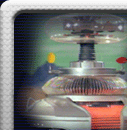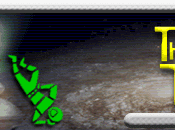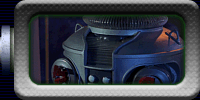 Craig
R. ( B9-0032 ) Craig
R. ( B9-0032 )

I knew
from the first moment I saw them, that the beautiful laser cut steel
treadsections made by Scott Sanderson were exactly what my robot
needed. They were steel like the originals, and would provide a
good heavy base for my costume robot. Not to mention the awesome
quality. I bought Scott's "kit" version which meant he
welded them together, then I had to do all the grinding, and finishing
work. Because I live relatively close, Scott offered to let me do
the grinding in his garage, so I went off to Cleveland and told
my wife I would be home by dinner time.

I ended
up spending the entire weekend in his garage! It was A LOT
of work! Here we are lining up to weld on the real working hinges.

Danger!
Danger! Yes, they fit! Thanks Scott!

Now, back
in my garage, its time for the finer finishing work. Scott welded
some steel into the top corners of the tread openings so I could
grind in the radius details with my Dremel. Again, a lot of work!

I wanted
to get all the details right on my treadsections and I studied photos
very closely. One thing I noticed was that there were not sharp
corners on the originals and the inside corner where the "step"
meets the side, is a nice rounded cove. I had Scott add some extra
welds there, covered them up with Bondo, and sanded them to a nice
smooth radius.

Another
detail I noticed on the original robot was that the upper wheels
seemed to be higher than what is specified in the original Studio
blueprints. The original builders put the upper wheels much higher
than where they are in the studio prints, and the treads were right
up at the very top of the openings. I really wanted to add this
detail, but Scott's treadsections (as well as almost every other
treadsection made since the originals) were made using the studio
blueprints. This meant that I very carefully had to re drill all
the upper holes 11/16" higher, and close in all the old holes.
I think Scott thought I was nuts when I asked him to weld in all
the upper holes! This picture shows a wheel in the relocated holes.

This shows the jig I made to trim the side panels. It is simply
a scrap piece of 3/4" plywood that has a slit cut for the table
saw blade. The slit is wide enough to allow some adjustment. This
made it very quick work to trim the panels. The corners were sanded
round with my stationary belt sander.

I trimmed the panels so they were shy of the treadsection edges
about 1/16" to 1/8". This is how the original panels were,
plus it prevents the edges of the panel from getting snagged. I
decided to attach the side panels with tiny 4-40 flat head machine
screws, 13 on each panel. Lucky for me my drill press was large
enough to handle the task! Tapping the holes was the real fun though!

Finally, all primed and ready for the paint shop! All in all, I
spent two full 15 hour days on EACH treadsection to do the finishing
work.

Here they are in the paint shop. They do have a texture on them,
but its hard to see in the picture. The texture is a spray on textured
paint called SEM Texture Coating 39853. The silver is a color to
match Duplicolor T229 SilverM.

Here I'm doing the final assembly and putting on the wheels and
treads. The wheels are CNC machined solid aluminum, and the treads
are real rubber treads by Norman Sockwell.

The Finished product!

This shows the modified power connector on the back. My power supply
and sound source are located outside of my robot.
|
















